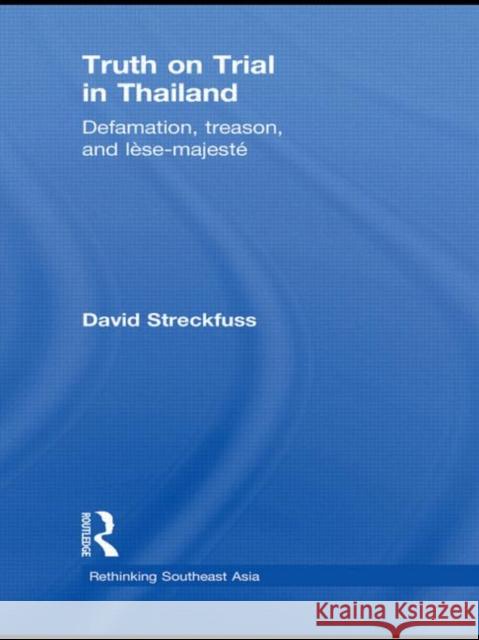Truth on Trial in Thailand: Defamation, Treason, and Lèse-Majesté » książka
Truth on Trial in Thailand: Defamation, Treason, and Lèse-Majesté
ISBN-13: 9780415414258 / Angielski / Twarda / 2010 / 494 str.
Truth on Trial in Thailand: Defamation, Treason, and Lèse-Majesté
ISBN-13: 9780415414258 / Angielski / Twarda / 2010 / 494 str.
(netto: 699,68 VAT: 5%)
Najniższa cena z 30 dni: 705,23
ok. 16-18 dni roboczych.
Darmowa dostawa!
Since 2005, Thailand has been in crisis, with unprecedented political instability and the worst political violence seen in the country in decades. In the aftermath of a military coup in 2006, Thailand's press freedom ranking plunged, while arrests for lese-majeste have skyrocketed to levels unknown in the modern world. Truth on Trial in Thailand traces the 110-year trajectory of defamation-based laws in Thailand. The most prominent of these is lese-majeste, but defamation aspects also appear in laws on sedition and treason, the press and cinema, anti-communism, contempt of court, insulting of religion, as well as libel. This book makes the case that despite the appearance of growing democratization, authoritarian structures and urges still drive politics in Thailand; the long-term effects of defamation law adjudication has skewed the way that Thai society approaches and perceives "truth." Employing the work of Habermas, Foucault, Agamben, and Schmitt to construct an alternative framework to understand Thai history, Streckfuss contends that Thai history has become "suspended" since 1958, and repeatedly declining to face the truth of history has set the stage for an endless state of crisis. This book will be of interest to students and scholars of South East Asian politics, Asian history, and media and communication. David Streckfuss is an independent scholar who has lived in Thailand for more than 20 years. His work primarily concerns human rights, and political and cultural history.
With defamation now back in the center of debate on press freedom of Thailand, following some high profile cases, this book examines how defamation, first codified in a more modern sense in 1899, later became known as Thailand’s national security laws, covering lese majesty, sedition, rebellion by word, insult of national symbols, press laws, and insult of the courts and religion.
It was only a few years ago that Thailand was celebrated as having the 'freest press in Asia.' Now, the Press Association of Thailand, human rights watchers, and progressive voices are calling on the government to review the way the defamation charge is used and prohibit being used as a political tool.
Based on an award-winning dissertation on Southeast Asian studies, this book explores the basics of the defamation law as it applies to private-sphere defamation and looks at the peculiar permutations created by the use of public-sphere defamation laws in Thailand, particularly in terms of creating and protecting a nationalist identity.











